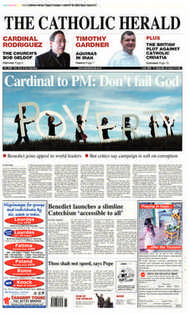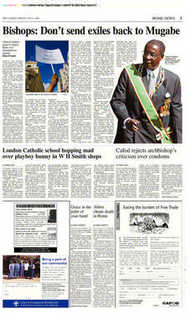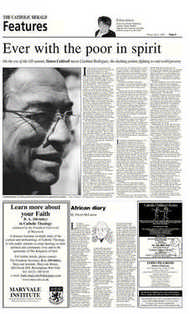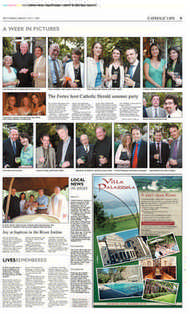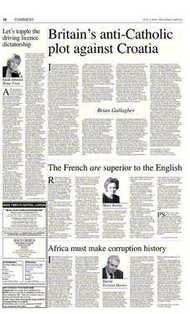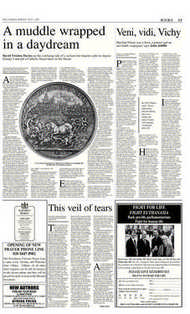Page 8, 1st July 2005
Page 8

Report an error
Noticed an error on this page?If you've noticed an error in this article please click here to report it.
Tags
Share
Related articles
Surely, A Holy Land Deserves Better Than This
Israeli Army Blows Up Shrine
‘soon There Will Be No Christians Left’
Waiting To Rebuild A Home
Helping To Preserve A Christian Presence In The Holy Land
‘Our anger has achieved nothing’
Ahmad Al’Azzeh, a young teacher, was journey ing to a small Palestinian village in the hills north of Ramallah when he was arrested at a checkpoint. Driven to a military centre, he was hooded and beaten and then asked by his interrogator why he was teach ing “b ”.
Ahmad had been on his way to deliver a workshop on non-violence to the villagers of Qarawat Bani Zeid. He is one of 16 young Palestinians working for the Holy Land Trust, a charity established in Bethlehem in 1998. The trust aims to support and unite communities suffering from the trauma of prolonged military occupation, and to teach “non-violence” not only as a form of resistance but “as a whole way of life: how you are in the house, in the school, in the street”.
Ahmad was one of a team of three men and three women sent out to the village following a telephone call for help. International peace activists had suggested the contact after Israeli soldiers had shot and killed five young people including an 11-year-old child in April and May 2003. The following summer 308 adults and children received 15 hours of training. Eight other villages have now asked for the same programme.
Sami Awad, director of the project, is convinced that the development of a long-term, non-violent resistance strategy can bring about change, primarily the ending of the occupation in the West Bank. Husam Jubran, his programme coordinator, says that violence is often generated by a lack of respect.
“Shame and dignity are big words in Palestine,” he explains. The team emphasises the importance of communication skills, particularly in a family setting and participants are encouraged to role-play the tense situations they too often find themselves in.
Teenagers imagine that they are at a checkpoint, negotiating with a soldier to let their sick mother pass for treatment. “Keep your dignity,” the peace workers advise. “Speak up but be respectful.” The results are dramatic. Children who were formerly shy and withdrawn appear more assertive and confident.
The villagers are also asked to think strategically, rather than simply to react to situations.
During one session, an Israeli jeep drove into the village. All the boys immediately left the classroom to pelt the car with stones. When they returned, they were defiant. “Don’t we have the right to protect ourselves?” they demanded. Husam asked them to reconsider what they were doing.“What were your goals in throwing those stones?” he asked. “Were they achieved? What might the consequences have been?” He pointed out that had the soldiers used tear gas it could have harmed women and children nearby. Together Husam and the boys discussed alternative strategies: the possibility of standing at the entrance to the village in a less populous area to prevent the jeeps from entering. This would be risky: did they want to take those risks?
This brought the Palestinians to see nonviolence not as cowardly and weak, but as active and a sign of strength.
Dr Lucille (Sis) Levin, whose husband Jerry was kidnapped and held hostage for a year by Hezbollah in 1984, works as a volunteer for the trust. She was born in Alabama and is passionate about the work that Ahmad and others are doing. “We had a civil war in our country,” she explains “and Martin Luther King’s peaceful protest broke the back of violence.” For Sis the solution to a sustainable peace programme lies in education and teacher-training. Both she and Ahmad are throwing their considerable energy into a new programme called Peacebuilders. This is directed at teachers already working in schools, university students and some exceptional high school children who can mentor younger pupils and become effective youth leaders. To date, programmes have been run in four different universities: Jenin, Bir Zeit, Al Quds (Jerusalem) and Bethlehem. The aim is to train every teacher in Bethlehem and after that all of Palestine. Sis and Ahmad hope that peace education will become part of the national syllabus and will be a necessary requirement for a teacher’s certificate.
Their peacebuilder lesson plans are sufficiently organised to rejoice an Ofsted inspector’s heart. Everything is geared towards a “peaceful” classroom: this includes an emphasis on praise, recognising the harm of “put-downs”, and a discussion of the meaning of words such as empathy, anger, apology and acceptance. “The wise person” is studied as a role model, before turning to particular heroes of peace who include Gandhi and Martin Luther King. Democracy and the history of Palestine are also studied. A child with a peaceful classroom will learn to be resilient, the argument goes. Certainly in a country where, according to Defence Child International statistics, 27 children have died from military or settler violence during the ceasefire months of 2005, resilience is a much needed quality.
Nidal, a precociously bright 16-year-old at the École des Frères, is the youngest of the peacebuilders. He has absorbed its precepts.
“We have been angry for 15 years and have achieved nothing,” he says. “It is human to be angry but we shouldn’t direct our anger at the Israelis.” Yet traces of the vulnerable 11-year-old who saw his house destroyed by shelling remain. He told me he would find it hard to live next door to an Israeli though he thinks “in the end, we will have to have one state”.
In the village kindergarden, a school where many of the children’s fathers are in prison, four-yearolds talk about being good neighbours.
“We don’t talk about the Israelis, as that would politicise the discussion,” explains Ahmad. “Forgiveness is something much more general.” Mariam Musleh, the pupils’ head teacher, has already received the Peacebuilder training along with her staff. She firmly believes that the programme will work and hopes to extend it to include the children’s par ents. The school may appear to be a haven of calm, but on the street and in the homes of many Palestinians there is still anger and deep despair.
It is too early to assess the impact of these programmes; as the Trust points out, they are investing in a long-term strategy.
But as peacemakers they are not alone, as a spokeswoman for the International Women’s Peace Service explains: “Non-violent resistance is really spreading, and now there are many internationals, including an increasing number of Israeli citizens, who stand alongside the Palestinian villagers when their homes and lands are threatened by military action or the encroaching wall.” At the entrance to the settlement in Hebron young Jewish boys are playing a ball game behind a Beit Midrash. A plaque records that the building is a memorial to a beloved daughter.
“An Arab terrorist lifted his gun and fired... tragically taken from us before her time.” Beneath it, Jewish teenagers sit and talk. To my question:“Do you want peace?” the one English speaker answers politely: “Of course.” “But so do the Palestinians,” I reply.
“It is sad you believe their lies,” he says. “But I do not blame you, everybody does.” “They want a little of their country,” I tell him.
“It is our country,” he says. “I know it. That is what God says.” For more information visit www.holylandtrust.org or contact the trust at 529 Manger Street, Bethlehem, Palestine. Telephone: 00 972 2 2765930
blog comments powered by Disqus


